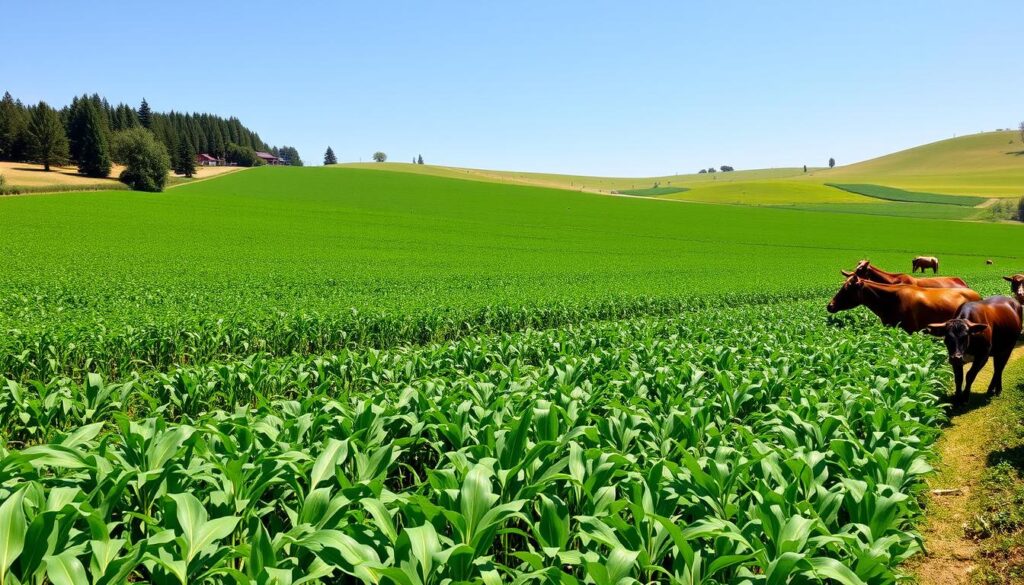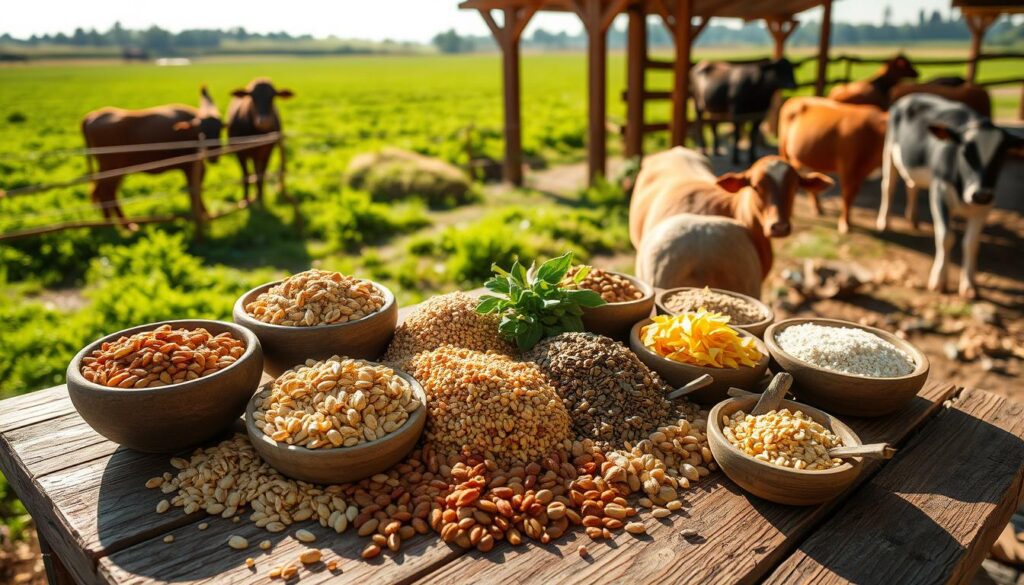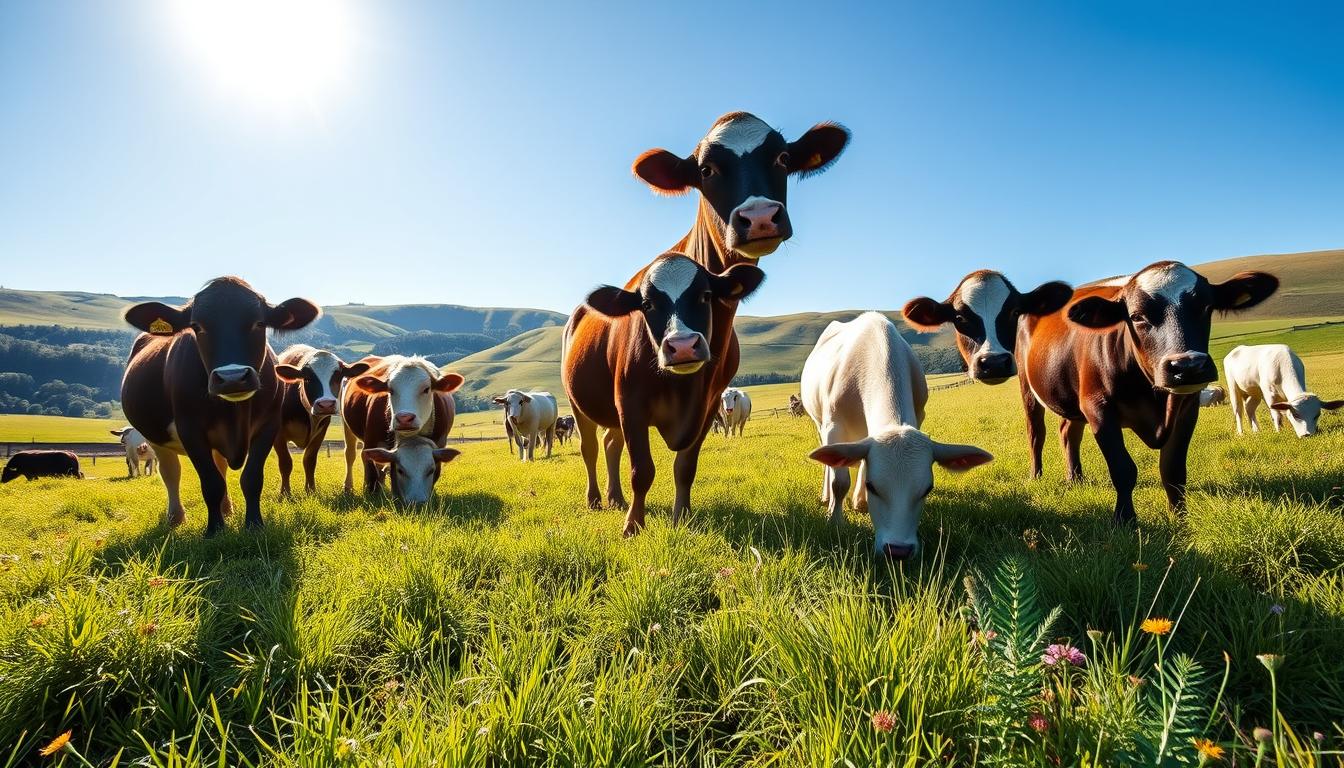Imagine a world where over 70% of antibiotics meant for humans are given to animals. By moving to natural farm feed, we can make animals healthier and fight antibiotic resistance. This fact is a call to change how we feed the animals that feed us.
Using eco-friendly animal feed and sustainable farming practices is key. It’s not just a trend; it’s crucial for our animals’ health and longevity.
In this guide to healthier livestock through natural farm feed, we’ll see how these choices improve animal well-being. We’ll also talk about the benefits of eco-friendly animal feed and sustainable farming practices. Let’s explore how farms can thrive with nature’s help.
The Importance of Natural Farm Feed for Livestock Health
The global livestock industry is changing, focusing more on animal feed quality. This is because of its impact on animal health and productivity. The move to organic livestock feed and pasture-raised feed options shows farmers are aware of natural feed’s benefits.
It’s key to understand how natural feed helps keep livestock healthy. This section looks at natural diet benefits, compares natural vs. conventional feed, and how diet can prevent diseases.
Understanding the Benefits of a Natural Diet for Animals
Natural farm feeds are important for animal health. They are free from synthetic additives and full of nutrients. This boosts their digestive health and immune systems.
A strong immune system means animals are less likely to get sick. This leads to healthier and more productive animals. The nutrients in organic livestock feed also improve the quality of animal products like milk, meat, and eggs.
Comparing Natural vs. Conventional Livestock Feed
The debate between natural and conventional feed is about health and sustainability. Conventional feeds may include growth hormones and antibiotics. These can increase short-term productivity but can harm animal health in the long run.
Natural feeds, on the other hand, promote animal health and improve the safety and quality of animal products for humans.
The Role of Diet in Preventing Livestock Diseases
Nutrition is crucial in preventing diseases in livestock. Diets full of essential nutrients from pasture-raised feed options help animals fight off diseases. Natural feeding practices also lower disease rates like BSE and mastitis, linked to poor feed quality.
Switching to natural farm feed supports animal health and meets consumer demand for healthier food. Using organic and pasture-raised feeds is key to preventing diseases and sustainable farming.
What Constitutes Natural Farm Feed?
Knowing what makes up natural farm feed is key for keeping livestock healthy. This type of feed is known for its purity and how it’s made. It mainly includes non-gmo farm feed, organic animal feed, and farm-fresh feed options.
Non-GMO feed is crucial because it doesn’t have genetically modified organisms. These can harm animals’ health. Growing these crops protects the environment and keeps animals safe, sticking to natural ways without genetic changes.
Organic animal feed is made without synthetic chemicals. This helps animals stay healthy and keeps the environment clean. It also helps keep water systems free from harmful chemicals.
Farm-fresh feed is all about being fresh and full of nutrients. It’s given to animals when it’s at its best, helping them stay healthy.
- Non-GMO Farm Feed: Keeps animals safe from harmful genetic changes.
- Organic Animal Feed: Offers a clean diet without harmful chemicals.
- Farm-Fresh Feed Options: Provides the most nutrients by being fresh.
Together, these three parts of natural farm feed improve animal health and protect the environment. By picking feeds that meet these standards, farmers and buyers help make farming better and more sustainable.
Sustainable Animal Nutrition and Its Impact on Livestock
The idea of sustainable animal nutrition is key in today’s farming. It helps keep animals healthy and productive while also protecting the environment. By using eco-friendly farm feed and holistic farm feeding solutions, farms and their ecosystems benefit greatly.
Eco-friendly Animal Feed Practices
Using eco-friendly animal nutrition means choosing resources that are good for the planet. This includes picking the right raw materials and how feed is made and delivered. By choosing organic feed and cutting down on transportation, farms can help make the Earth healthier.
Measuring the Effects of Sustainable Nutrition on Health
Studies show that sustainable nutrition is good for animal health. Animals fed with eco-friendly, nutritionally balanced food have stronger immune systems and grow better. This shows that sustainable animal nutrition really works.
| Health Factor | Conventional Feed | Eco-friendly Feed |
|---|---|---|
| Immune System Strength | Standard | Enhanced |
| Growth Rate | Variable | Consistent |
| Longevity | Lower | Higher |
Choosing holistic farm feeding solutions helps animals stay healthy. It also makes farming more sustainable. This is good for farmers and those who buy their products.
Exploring Organic Livestock Feed Options
The need for sustainable and healthy livestock products is growing. Farmers are looking into organic livestock feed to meet these demands. Premium natural feed blends are leading this change. They offer many benefits for both the animals and the environment.
It’s important for farmers to know what’s in these feeds. Organic livestock feed doesn’t have synthetic additives. It’s made from materials grown without harmful chemicals.
Products with the organic label meet strict standards. They are safe, non-GMO, and free from chemicals.
- Alfalfa Meals
- Organic Corn
- Soybean Meal
- Organic Barley
Each feed component is key for a balanced diet. Alfalfa meals are great for cattle and sheep because they’re full of fiber and protein. Organic corn gives them the carbs they need.
Certified premium natural feed blends help animals stay healthy. They also support farming that’s good for our planet.
Labels and certifications are important for organic livestock feed. They show the feed’s quality and where it comes from. This helps consumers trust the organic products for their animals.
Choosing the right premium natural feed blends is crucial. Different animals need different feeds. For example, poultry needs a high protein diet for egg production. Cattle, on the other hand, need more fiber for better digestion and milk quality.
The Rise of Pasture-Raised Feed and Grass-Fed Animal Nutrition
In recent years, the demand for pasture-raised livestock feed and grass-fed animal nutrition has grown. Farmers and consumers are looking for sustainable and healthy alternatives to traditional feed. These natural methods improve animal health and quality of farm products.
Understanding the Shift: Livestock used to eat grain-based diets, which are cheap but lack important nutrients. Grass-fed and pasture-raised diets offer many benefits. They affect animal growth and the quality of the final product.
Differences Between Pasture-Raised and Conventional Feed
Pasture-raised systems let animals roam and eat natural food from the land. This is different from traditional feed systems, where animals are confined and fed to grow fast. Pasture-raised livestock feed gives animals a balanced diet, making them healthier and more resilient.
Grass-Fed Nutrition Benefits for Livestock
The benefits of grass-fed animal nutrition go beyond animal health. Grass-fed animals produce meat and dairy with more omega-3 fatty acids, antioxidants, and nutrients. These products are loved for their better taste and texture.
| Benefit | Pasture-Raised Feed | Conventional Feed |
|---|---|---|
| Omega-3 Levels | High | Low |
| Antioxidant Content | Higher Antioxidants | Fewer Antioxidants |
| Environmental Impact | Lower Impact | Higher Impact |
| Animal Welfare | Improved Welfare | Potentially Compromised |
The movement towards sustainable agriculture is growing. People are valuing practices that help animals and the planet. Pasture-raised livestock feed and grass-fed animal nutrition are key steps towards these goals. They offer better nutrition and support humane, environmentally friendly farming.
Natural Farm Feed and the Non-GMO Movement
The world of agriculture is changing fast. Now, more farms are using non-GMO animal feed. This move is part of a bigger trend towards non-GMO products. People are starting to see the health benefits these feeds offer to animals and to those who eat animal products.
Why Non-GMO Animal Feed Matters
Non-GMO animal feed is key for animal health and for people who care about what they eat. The reason is simple: some worry about the long-term health effects of GMOs in animal diets. By picking non-GMO feed, farmers give their animals natural, healthy food without GMOs.
Identifying and Sourcing Non-GMO Farm Feed
Finding non-GMO farm feed means looking closely at where it comes from and its labels. Many farmers choose feed that’s been certified non-GMO. This ensures the feed meets strict standards without genetic modification.
Because of demand, many suppliers now clearly label their non-GMO feed. This makes it easier for farmers to choose the right feed. It also builds trust in the non-GMO movement.

| Feed Type | Non-GMO Status | Common Usage |
|---|---|---|
| Soybean Meal | Non-GMO Certified | Poultry and Dairy Cattle |
| Corn | Non-GMO Certified | Swine and Poultry |
| Alfalfa Meal | Non-GMO Verified | Ruminant Animals |
Holistic Dietary Supplements for Livestock Well-being
Adding holistic dietary supplements to livestock diets is key for better health and productivity. These natural supplements boost nutrition and help with digestion, immunity, and stress. They work best with non-GMO farm feed to make feeding programs more effective and beneficial for animals.
Farmers need to know about the right holistic dietary supplements for their animals. These come from non-GMO sources like herbs, probiotics, minerals, and vitamins. They help animals stay healthy and absorb nutrients better.
- Probiotics keep the gut healthy and improve digestion.
- Herbal extracts boost the immune system and fight off diseases.
- Vitamins and minerals increase energy and productivity.
To use these supplements well, farmers must understand their animals’ nutritional needs. They also need to know how to mix these supplements into their feed. This ensures animals get the most out of these holistic approaches without any harm.
| Supplement Type | Benefits | Recommended for |
|---|---|---|
| Probiotics | Enhances gut health, improves digestion and nutrient absorption | All livestock types |
| Herbal Extracts | Strengthens immune systems, increases disease resistance | Poultry and Ruminants |
| Mineral Blends | Boosts overall health, supports bone development | Cattle and Swine |
| Vitamin Mixes | Improves vitality and coat condition | Horses and Poultry |
Farm to Table Feed Solutions: From Premium Blends to DIY Mixes
More people and farmers are choosing farm to table feed solutions. This move supports local farms and ensures animals get the best food. It’s a healthier choice for everyone involved.
Creating Your Own Natural Farm Feed Blends
For those into DIY natural farm feed, it begins with local, non-GMO ingredients. Mixing grains like oats, barley, and corn makes a good diet. It adds fiber, proteins, and nutrients to animal feed.
Emergence of Farm Fresh Feed Options in Markets
The demand for farm to table feed solutions is rising. Farmers markets and local suppliers now offer fresh, high-quality blends. These are great for both big and small farms, helping animals get the best nutrition.

| Feed Type | Ingredients | Benefits |
|---|---|---|
| DIY Poultry Mix | Cracked corn, soybeans, calcium carbonate | High energy and protein, supports shell strength |
| Commercial Sheep Blend | Alfalfa, clover, oats | Nutrient-rich, supports wool and overall health |
| Organic Pig Feed | Barley, peas, linseed | Improves digestion, lean muscle development |
Choosing DIY natural farm feed or farm to table feed solutions is good for the environment. It makes animals healthier and helps local economies. As people want better food for animals, these options are a smart choice.
Conclusion
In this article, we’ve looked at the many benefits of using natural farm feed for livestock. By choosing sustainable farming practices, farmers help their animals and our planet. We talked about how eco-friendly farm feed like pasture-raised and grass-fed nutrition is better than regular feed.
This leads to better quality food for people all over the world. The shift towards holistic dietary supplements shows the farming world cares about animals and nature. Choosing non-GMO feed is key to this approach, keeping feed as natural as possible.
This mix of ethics and farming creates a better future for all. It’s clear that our choices in farming affect more than just our surroundings. So, we should support farmers who use eco-friendly farm feed.
And farmers should keep looking for and using sustainable farming practices. Together, we can make sure livestock and our planet stay healthy. This way, we ensure a future where food and nature go hand in hand.
